
The 1968 United States presidential election was the 46th quadrennial presidential election, held on Tuesday, November 5, 1968. The Republican nominee, former vice president Richard Nixon, defeated both the Democratic nominee, incumbent vice president Hubert Humphrey, and the American Independent Party nominee, former Alabama governor George Wallace. This was the last election until 1988 in which the incumbent president was not on the ballot. This is the most recent election where a third-party candidate won a state.

A Reagan Democrat is a traditionally Democratic voter in the United States, referring to working class residents who supported Republican presidential candidates Ronald Reagan in the 1980 and the 1984 presidential elections, and George H. W. Bush during the 1988 presidential election. The term Reagan Democrat remains part of the lexicon in American political jargon because of Reagan's continued widespread popularity among a large segment of the electorate.

The States' Rights Democratic Party was a short-lived segregationist political party in the United States, active primarily in the South. It arose due to a Southern regional split in opposition to the national Democratic Party. After President Harry S. Truman, the leader of the Democratic Party, ordered integration of the military in 1948 and other actions to address civil rights of African Americans, including the first presidential proposal for comprehensive civil and voting rights, many Southern white politicians who objected to this course organized themselves as a breakaway faction. They wished to protect the ability of states to maintain racial segregation. Its members were referred to as "Dixiecrats", a portmanteau of "Dixie", referring to the Southern United States, and "Democrat".

The People's Party, also known as the Populist Party or simply the Populists, was an agrarian populist political party in the United States in the late 19th century. The Populist Party emerged in the early 1890s as an important force in the Southern and Western United States, but collapsed after it nominated Democrat William Jennings Bryan in the 1896 United States presidential election. A rump faction of the party continued to operate into the first decade of the 20th century, but never matched the popularity of the party in the early 1890s.
Populism is a range of political stances that emphasize the idea of "the people" and often juxtapose this group with "the elite". It is frequently associated with anti-establishment and anti-political sentiment. The term developed in the late 19th century and has been applied to various politicians, parties and movements since that time, often as a pejorative. Within political science and other social sciences, several different definitions of populism have been employed, with some scholars proposing that the term be rejected altogether.

James Kimble Vardaman was an American politician from the U.S. state of Mississippi. A Democrat, he served as the Governor of Mississippi from 1904 to 1908 and then represented Mississippi in the United States Senate from 1913 to 1919.
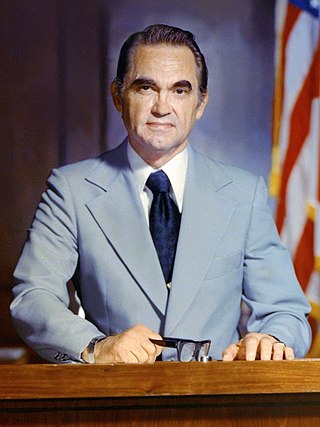
George Corley Wallace Jr. was an American politician and judge who served as the 45th governor of Alabama for four terms. He is remembered for his staunch segregationist and populist views. During Wallace's tenure as governor of Alabama, he promoted "industrial development, low taxes, and trade schools." Wallace sought the United States presidency as a Democratic Party candidate three times, and once as an American Independent Party candidate, being unsuccessful each time. Wallace opposed desegregation and supported the policies of "Jim Crow" during the Civil Rights Movement, declaring in his 1963 inaugural address that he stood for "segregation now, segregation tomorrow, segregation forever."

The Social Democratic Party is a liberal-conservative political party in Portugal that is currently the country's ruling party. Commonly known by its colloquial initials PSD, on ballot papers its initials appear as its official form PPD/PSD, with the first three letters coming from the party's original name, the Democratic People's Party. A party of the centre-right, the PSD is one of the two major parties in Portuguese politics, its rival being the Socialist Party (PS) on the centre-left.
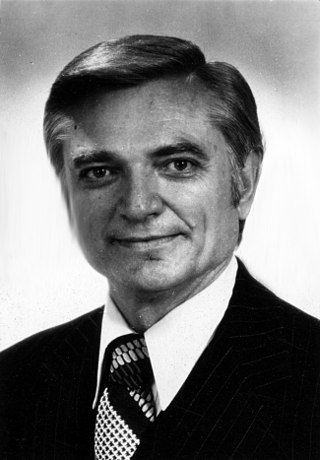
Charles Clifton Finch was an American politician who served as the 57th governor of Mississippi from 1976 to 1980.
A big tent party, or catch-all party, is a term used in reference to a political party having members covering a broad spectrum of beliefs. This is in contrast to other kinds of parties, which defend a determined ideology, seek voters who adhere to that ideology, and attempt to convince people towards it.

Right-wing populism, also called national populism and right-wing nationalism, is a political ideology that combines right-wing politics with populist rhetoric and themes. Its rhetoric employs anti-elitist sentiments, opposition to the Establishment, and speaking to or for the "common people". Recurring themes of right-wing populists include neo-nationalism, social conservatism, economic nationalism and fiscal conservatism. Frequently, they aim to defend a national culture, identity, and economy against perceived attacks by outsiders. Like all forms of populism, right-wing populism has associations with authoritarianism, while some far right-wing populists draw comparisons to fascism.

The Mississippi Democratic Party is the affiliate of the Democratic Party in the state of Mississippi. The party headquarters is located in Jackson, Mississippi.
Social democracy is a political, social, and economic philosophy within socialism that supports political and economic democracy and supports a gradualist, reformist and democratic approach towards achieving socialism. In practice, social democracy takes a form of socially managed welfare capitalism, achieved with partial public ownership, economic interventionism, and policies promoting social equality.

The 1978 United States Senate election in Mississippi was held on November 5, 1978. Incumbent Democratic U.S. Senator James Eastland decided to retire.

In 1896, William Jennings Bryan ran unsuccessfully for president of the United States. Bryan, a former Democratic congressman from Nebraska, gained his party's presidential nomination in July of that year after electrifying the Democratic National Convention with his Cross of Gold speech. He was defeated in the general election by the Republican candidate, former Ohio governor William McKinley.
Centrism is a political outlook or position involving acceptance or support of a balance of social equality and a degree of social hierarchy while opposing political changes that would result in a significant shift of society to the left or the right.
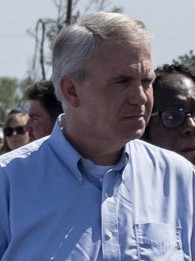
Brandon Everitt Presley is an American politician who served as a member of the Mississippi Public Service Commission from the Northern District from 2008 to 2024 and mayor of Nettleton, Mississippi, from 2001 to 2007. He is a member of the Democratic Party.
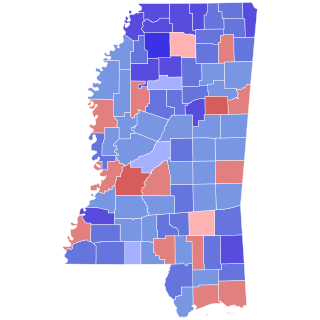
The 1975 Mississippi gubernatorial election took place on November 4, 1975, in order to elect the Governor of Mississippi. Incumbent Democrat Bill Waller was term-limited, and could not run for reelection to a second term. As of 2022, this was the last time Washington County voted for the Republican candidate.

The 1944 United States presidential election in North Carolina took place on November 7, 1944, as part of the 1944 United States presidential election. North Carolina voters chose 14 representatives, or electors, to the Electoral College, who voted for president and vice president.
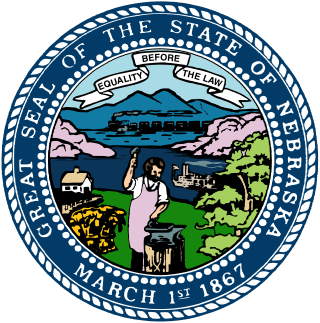
The 1900 Nebraska gubernatorial election was held on November 6, 1900.
















